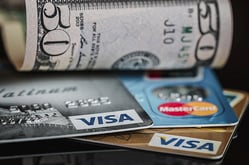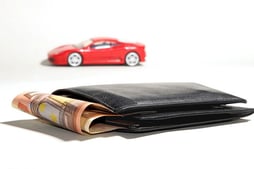Having a good chunk of money saved can help you manage finances during tough times, and saving money doesn't have to be an arduous process. A little bit of common sense and small sacrifices may be all you need to grow your savings account. Let's take a look at what you're paying for monthly and how you can regain control of your finances.
Credit Card Debt
Using a credit card is so easy but when it comes with a high interest rate, you're left with the worst types of debt you can have. Your credit card balance grows exponentially when you pay the minimum each month. If you have more than one credit card and cannot pay the full balance on each card every month, concentrate most of your effort on paying more toward the cards with the highest interest rates. Start paying down your debt by applying work bonuses and monetary gifts to the debt and consider selling things you no longer need.
- Pay off high-debt credit cards first
- Apply bonuses and monetary gifts to debt
- Sell items you no longer need to pay down debt
- Ask for a reduced interest rate
- Consolidate multiple credit cards
- Zero-interest cards
Another tip to help lower your credit card debt is to reach out to your credit card company regularly to see if they'll reduce your interest rate. If you've consistently paid your bill on time, there is a higher likelihood that they will honor your request.
If you have a high amount of debt on multiple cards, you may want to consider a consolidation loan with a fixed payment and interest rate. If this isn't an option, consider rolling your highest rate credit card into a zero or low rate card. If you're paying $200/mo. towards a $3400 balance at 18%, it would take you 20 months to pay off the card and you'd be paying $554 in interest. Take advantage of rolling that card into a 12-month 0% interest card, then another at the end of the year -- you could pay off the same debt in 17 payments with no interest. Keep in mind, this is based on not using your card for additional purchases.
$200/mo. towards a $3400 balance, 18% interest, 20 months to pay off the card with $554 in interest
OR
0% interest, 17 months to pay off the card, saving $100's
Another way to help tackle credit card debt is to only use a credit card in an emergency (ex. stranded on the side of the road and need to pay a tow company) and pay it off immediately. Also, consider the "3 envelope" strategy developed by Dave Ramsey to avoid overspending.
Mortgage Refinance
If you own a house, refinancing your mortgage can be a great way to save a large amount of money. If you've got a fixed-term mortgage, your interest rate stays the same throughout the life of the loan. Refinance when interest rates are low and you could save tens of thousands of dollars over the life of your loan. Be aware of fees associated with refinancing your home which can add up quickly and may not result in significant savings (ex. origination fee: up to 1.5% of the loan amount).
- Application fee
- Origination fee
- Home appraisal fee
- Home inspection fee
- Recording Fee
- Points
- Other
Pay attention to these fees and whether or not they have to be paid up front or if they'll be rolled into your mortgage payments. If you plan on living in your home for a short period, refinancing might not be a good idea. Talk to a variety of lenders before deciding if a refinance is right for you.
Car Loans
A car loan can be a good form of debt since the payment is usually fixed and you pay a finite amount. On the other hand, if you get behind on the payments you've got big problems. Manage this debt by scheduling payments close to the date you receive your paycheck. This will ensure you have money in the bank when your scheduled payment comes due, and you can avoid extra fees and damage to your credit score.
You might have an opportunity to secure lower fees on your car loan if you talk to your lender. Maybe you've noticed interest rates lower than what you're currently paying. Or, maybe your financial situation has changed for the worst (ex. pay cut).
This is a great time to ask your lender if you can qualify for a better interest rate. This could save you $100's if not $1000's over the life of your loan.
Last but not least, consider trading in your high-monthly-payment car for a lightly used car -- you could save $100's each month.
Overdraft Fees
If you aren't checking your bank account balance regularly, you may find yourself paying overdraft fees when you buy something without having enough money to cover it. Overdraft fees will cost you $34-$38 per offense. If this happened 4x year, you would be wasting over $100/year on avoidable fees. If you happen to get an overdraft fee, call your bank right away and ask if you can get a one-time late fee exception. Many banks will comply, especially if your account is usually in good standing. Then, set up reminders to pay bills a couple of days before they're due and check your bank account beforehand to ensure there are enough funds.
ATM Fees
If you're using your debit card to draw cash from out-of-network ATM's, you're paying extra fees. Avoid paying an extra $4-$6 each time you use an ATM by using your bank's ATM, getting cash back at the point of sale (ex. buying groceries and asking for $40 cash), or visiting your bank's website to get a list of free out-of-network withdrawal options.
Recurring Monthly Subscriptions
We live in an era of recurring monthly subscriptions. Netflix, StitchFix, Amazon Prime, Adobe Lightroom, Blue Apron, the list goes on and on. Consider which of these subscriptions you can live without and save $100's each year. If your closet is already bulging, consider doing without the clothing subscription you receive every month. Eliminating or cutting back on these subscriptions will help grow your savings and you probably won't even miss them.
Conclusion
When it comes to saving money during tough financial times, take a look at your monthly spending habits and determine where you can save. Whether you want to save $15/month on a subscription, or $100's/month on your home or car, there are many ways to cut back and get ahead. I didn't even mention your morning espresso. Don't get me started on that... Good luck!














